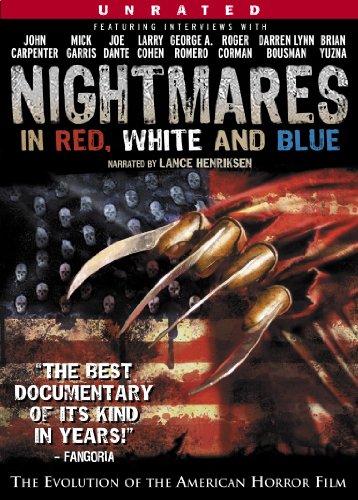Have you ever recalled one of your dreams and really analyzed it? Did you gather all the elements and realize that they represented deeper desires and fears you have in the material world... and that you are really f'ed in the head?
We could say from looking at what America has produced in cinema, that America has it's own collective conciousness. America's hopes and fears are fairly obvious up front, but when America dreams and makes art, something very scary comes out.
Nightmares in Red, White and Blue is an excellent documentary for the horror buff, history buff, and anyone asking the question, "Why the heck are American's obsessed with violence?"
If you enjoyed Bravo's The 100 Scariest Movie Moments (one of my top favorite countdown shows!) you will love Nightmares. You see the evolution of the horror movie genre shaped by social upheavals, changes in standards, politics, and most importantly, war.
Psychologically, we see the movie monsters alter to society's changing fears. In 1910 Thomas Edison made a film adaptation of Mary Shelly's Frankenstien. A decent attempt at adapting a novel to film, it was a failure in theaters. It wasn't until after The Great War (WWI), when men were coming back injured and deformed like from no other war in history, film makers responded with the horror genre. They made their "monsters" mortal men who were hideous and cast aside by society, their ill fate causing them to be bitter and evil.
Nightmares explains how each decade's events, events that shapped the American psyche, were latently placed in horror movie topics, such as foreign evil-doers, body snatching, atomic insects, zombies, etc. Post Manson murders (and the end of the hippie era in general) gave way to extreme sexual blood lust movies, films about gangs of murderers senselessly terrorizing good people, and movies about the occult.
You thought that the b-movies, exploitation and slasher films were just mindless fun, but like the rings in a tree trunk, they reflect our own history back to us. So you sit down with America. Because you love America, you read between the lines of their dream journal and say,
"America, that's some heavy stuff. I think you might be paranoid about communists, have ptsd from the war, and were disenchanted by how the hippie movement went. Maybe you should talk to someone... Pft! Who am I kidding!? Repression is the backbone of these films. Get off on the blood and violence, or enjoy the allegory, who really cares? You got a good thing going America, don't change."
Sunday, August 28, 2011
Tuesday, August 2, 2011
Prisoner of Paradise: The Making of a False Film
 We have all seen our fair share of Holocaust films and documentaries. Though many of the stories are comparable, the atrocities committed are never easy to swallow. When I saw the description of Prisoner of Paradise, it was apparent to me that I had never heard of anything like this. For starters, the title of the film, Prisoner of Paradise, is and unexpected title for a Holocaust documentary. Even facetiously, how could any part of this period be considered a paradise?
We have all seen our fair share of Holocaust films and documentaries. Though many of the stories are comparable, the atrocities committed are never easy to swallow. When I saw the description of Prisoner of Paradise, it was apparent to me that I had never heard of anything like this. For starters, the title of the film, Prisoner of Paradise, is and unexpected title for a Holocaust documentary. Even facetiously, how could any part of this period be considered a paradise?The documentary follows Kurt Gerron, a Jewish German actor/entertainer from the 1920s and 30s, director in the 1940s. Gerron was captured like so many other Jewish talents, however, he was given a strange assignment while in captivity at the concentration camp, Theresienstadt.
Theresienstadt was the camp in which many Jewish actors, musicians, writers, and intellectuals were taken during the Holocaust. It was advertised as a more comfortable concentration camp for the privileged few. Not surprisingly, this was a lie. While the facilities were grand in appearance, they were altered for the Jewish guests. For extra money, a room with a view could be reserved for a prisoner, but they never taken to these better rooms. There was an auditorium that was available for the actors to put on performances, but the space could be used as a crypt at anytime.
It was Gerron's job to use his skills as a director to make a propaganda film that would try and prove to the Danish Red Cross and the outside world that the Nazi camps could be cultural centers, and a happy place where Jews could live separately from everyone else.
You discover what Gerron's existence was before the Nazi take over, and how he desperately tried to hold onto his freedom, and then his life. His story is moving and unique. You see a man with a literal and metaphorical gun to his head, extracting every ounce hope to put on celluloid. Hope from men, women and children that are surrounded with death. Simply put, Prisoner of Paradise is the best Holocaust documentary I have ever seen.
Subscribe to:
Posts (Atom)


